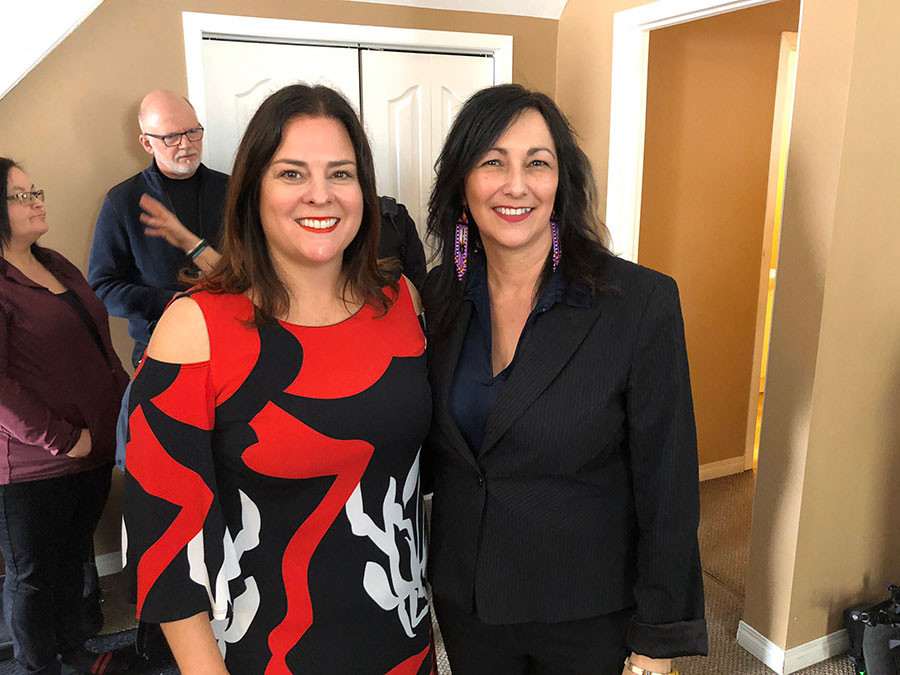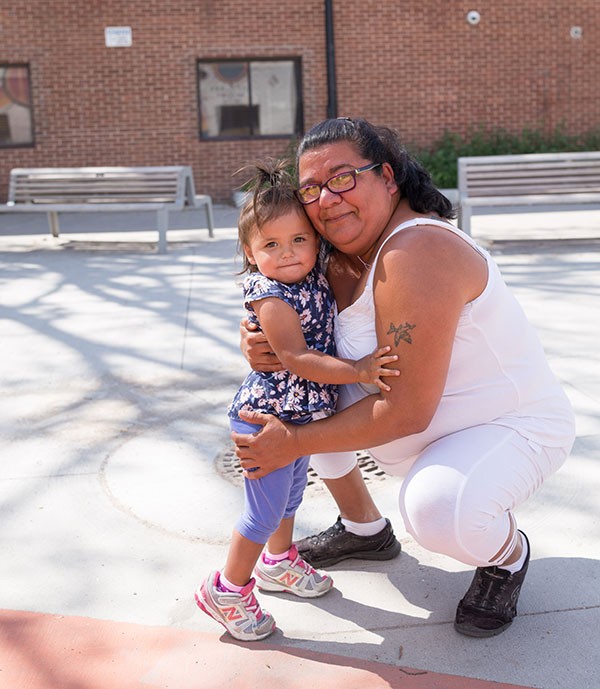Not your grandma’s family support
Granny’s House project hopes to support families and decrease CFS intervention
A familiar and innovative new family support project opened up in the North End two weeks ago: Granny’s House, or Kookum’s House (“Kookum” means “grandmother” in Cree), a home that fosters community and where parents or caregivers can drop off their kids for a few hours, secure in the knowledge that a team of “grannies” and “aunties” will take good care of them.
Granny’s House was organized by Gwekaanimad, a partnership of several organizations in the North End, including Andrews Street Family Centre, Blue Thunderbird Family Care, Mount Carmel Clinic, Wahbung Abinoonjiiag and the Winnipeg Boldness Project. Blue Thunderbird will be in charge of the house’s day-to-day operations with support staff from Andrews Street, Mount Carmel and Wahbung Abinoonjiiag. Manitoba’s provincial government has invested $400,000 in this pilot project in the hopes that it will help care for kids who would otherwise be involved in the child welfare system.
“Gwekaanimad” means “shifting winds” in Ojibwe.
Josie Hill (right) is the executive director of Blue Thunderbird Family Care, one of the partner organizations behind Granny’s House. // Supplied image Granny’s House offers 24-7, culturally relevant child-care support for Indigenous parents and children in Winnipeg. // Supplied image

Josie Hill, the executive director of Blue Thunderbird, says Blue Thunderbird’s work mostly consists of reunification work with children who have been in Child and Family Services (CFS) care and their families, in addition to providing support for families to get their children back and running a house for teenage girls in need of support systems.
“We’re an Indigenous organization, Indigenous-staffed, and we just care for the kids,” she says.
“We’ve recently opened Granny’s House, or Kookum’s House, which is more of a prevention program. Due to the history of Canada, many of our natural (community support) systems have been broken down,” Hill says. “Many of our families have been raised in care. They don’t have connections with their grandmother or their aunties. We’re trying to recreate that opportunity for when moms, parents, dads, grannies, whoever’s taking care of the kids need a break.”
Parents can drop kids off at the house or, if the house has a vehicle, the house staff can pick the children up. Hill says that parents “can come to the house, get to know the staff, get to know the grannies and aunties, so they feel comfortable that the children will be loved and cared for and safe.”
“I spent a lot of time at my granny’s house, which gave my mom a break (and) gave me a break. My granny enjoyed my company, so it’s just that kind of a resource,” she says. “So if the daycare’s closed, and mom’s going to lose her job if she doesn’t get to work, she can drop the kids off with granny, so she can go to work and have that peace of mind that her children are being cared for.”
Diane Roussin, project director for the Winnipeg Boldness Project, an initiative that researches and develops ideas in order to improve the lives of young children in the Point Douglas community, says Gwekaanimad and the Granny’s House project were born out of ongoing conversations between herself and the directors and project leaders working with the other partner organizations.
“As four women who are leading things in the North End, we have known each other for quite some time ... we’re all very focused on the question of what our community needs to be healthy, to be well, to thrive. What do children need to be well, to thrive?” she says. “All of us have been doing that work our whole lives and have been working on initiatives focused on that, and there’s always this conversation of ‘what do families need?’”
“Knowing that families who live in the inner city who experience a lot of challenges might not have as much access to places like their grandma’s house, wouldn’t it be great if we had a formal resource in our community that families can access?” she says.
Dana Riccio Arade, executive director of Wahbung Abinoonjiiag, says Gwekaanimad is “a very trusting and unique collective. We work together in a very grassroots way” to provide “true wraparound support. We’ve come together because there’s a need, and all of our organizations bring really important and valuable things to the table”
Arade says a key element of the project is an understanding that this kind of support is necessary and culturally important.
“We talked about how this is the way things used to be. My granny’s house was my safe space growing up,” she says. “Having Granny’s House is so integral from any point of contact, to have healthy relationships, to have a safe home, to know that there’s a safe person on the block, to have support in crisis.”
“This is a way to support families on a level that is so natural and yet is sort of unnatural, because the program is so unique. We’re trying to bring back that family dynamic, and we’re doing it with a granny’s love,” she says, as well as “bringing back the sense of pride and identity and communities, and strengthening the relationships between our elders and our children.”
Roussin says the biggest challenges in creating Granny’s House were getting funding and navigating regulations, both of which the provincial government was willing to help with.
“It feels to me like there’s a lot of complex pressing challenges facing all of us, including the provincial government, and child welfare is one of them. The amount of kids that are in care, the awful, awful health and wellness outcomes of kids being in care, the cost, all of it is a challenge for all of us,” she says.
“I think the answer is in all of us looking at each other and asking what we can do differently,” she says. “I think there’s an opportunity for community-led responses in terms of how we can better meet the needs of children and families.”
That requires listening to and funding Indigenous initiatives, Roussin says. “I think trying to make way more intentional efforts in focusing on Indigenous voices, Indigenous values, Indigenous worldviews and approaches is needed, and that’s what Gwekaanimad does and what Granny’s House does.”
Christy Holnbeck, senior project leader for child welfare reform initiatives with the Government of Manitoba, says the project – led by the “phenomenal consortium” of Gwekaanimad – met a lot of the government’s priorities in CFS reform.
“It was a unique proposal, because it was really responsive and really flexible and really based on the unique needs of the community and what these organizations knew those needs to be,” she says. Holnbeck also says the fact that Granny’s House delivers 24-7, culturally relevant support that is separated from CFS made it a unique project that she is excited to see the results of and potentially see scaled up.
Published in Volume 74, Number 18 of The Uniter (February 13, 2020)






